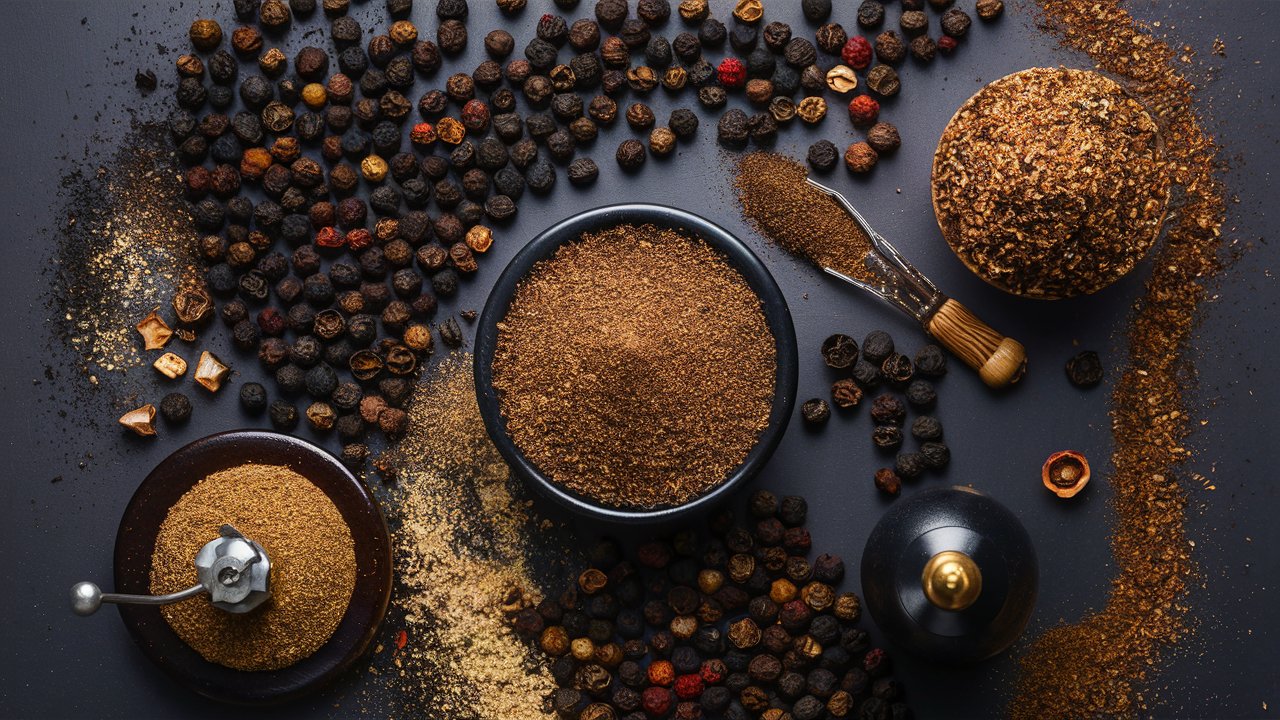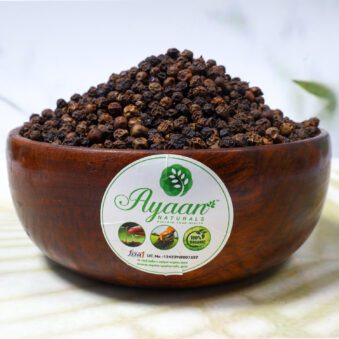- Your cart is empty
- Continue Shopping
Black Pepper: Discover Its Top Health Benefits and Culinary Uses
- Spices
- Posted on
-
by admin
- 0 comments

Discover the Flavorful and Health-Packed Benefits of Black Pepper
Introduction
Welcome to a world of flavor and health with Black Pepper, often hailed as the “King of Spices.” This humble spice has been cherished for centuries, not only for its ability to elevate dishes but also for its impressive health benefits. In this blog, we’ll explore Black Pepper through a series of questions and answers, providing insights into its unique properties and uses. Whether you’re a culinary enthusiast or an importer seeking premium Black Pepper from India, this blog will offer valuable information and guidance.
What is Black Pepper?
Black Pepper (Piper nigrum) is a flowering vine that produces small, dried fruits known as peppercorns. These peppercorns are used as a spice and seasoning, famous for their pungent flavor and versatility. The spice is made by grinding the dried peppercorns into a coarse or fine powder. Black Pepper is one of the most widely used spices worldwide, known for its rich taste and health-promoting properties.
What are the health benefits of Black Pepper?
Black Pepper offers a range of health benefits due to its active compounds, especially piperine. Here are some key benefits:
- Enhances Nutrient Absorption: Piperine in Black Pepper can enhance the bioavailability of various nutrients, including vitamins and minerals, making it easier for the body to absorb them.
- Supports Digestive Health: It stimulates the production of digestive enzymes, improving digestion and reducing symptoms like bloating and gas.
- Boosts Metabolism: The spice has been shown to increase metabolic rate, aiding in weight management and overall health.
- Antioxidant Properties: Black Pepper is rich in antioxidants that help combat oxidative stress and protect cells from damage.
- Anti-inflammatory Effects: It has anti-inflammatory properties that can help reduce inflammation and associated pain.
How is Black Pepper grown and harvested?
Black Pepper is grown on a vine that thrives in tropical climates. Here’s a brief overview of the cultivation process:
- Planting: Black Pepper vines are typically planted in well-drained, fertile soil with adequate moisture. They need a warm climate to grow effectively.
- Growth: The vines climb up support structures like trees or trellises. They produce small flowers that eventually develop into peppercorns.
- Harvesting: Peppercorns are harvested when they are still green and unripe. They are then dried to turn black, which enhances their flavor and aroma.
How many calories does Black Pepper have?
Black Pepper contains approximately 255 calories per 100 grams. Although it is used in small amounts as a spice, it is calorie-dense. Its main benefits come from its potent bioactive compounds rather than its calorie content.
What type of plant is Black Pepper?
Black Pepper (Piper nigrum) is a tropical climbing vine. It produces small, round fruits known as peppercorns, which are used as a spice. The plant is characterized by its heart-shaped leaves and small white or yellow flowers.
How can you use Black Pepper in your cooking?
Black Pepper is incredibly versatile and can be used in various ways:
- Seasoning: Use freshly ground Black Pepper to season meats, vegetables, and soups. It adds a sharp, spicy flavor that complements a wide range of dishes.
- Marinades: Add Black Pepper to marinades for an extra kick of flavor.
- Salads: Sprinkle freshly ground pepper over salads to enhance the taste and add a bit of heat.
- Baking: Incorporate Black Pepper into baked goods for a unique twist.
Additional Questions
What are the culinary uses of Black Pepper?
Black Pepper can be used in numerous culinary applications:
- Savory Dishes: Enhance the flavor of soups, stews, and sauces.
- Grilled Foods: Season meats, fish, and vegetables before grilling.
- Dressings: Add to salad dressings for a spicy touch.
- Snacks: Spice up popcorn or roasted nuts with a sprinkle of Black Pepper.
What are the 10 benefits of Black Pepper?
-
- Enhances Nutrient Absorption
- Supports Digestive Health
- Boosts Metabolism
- Antioxidant Properties
- Anti-inflammatory Effects
- Improves Cognitive Function
- Boosts Immune System
- Promotes Healthy Skin
- Aids in Weight Management
- May Help Fight Cancer
- Can you eat whole peppercorns as a snack, like eating peanuts? Is it dangerous?
Eating whole peppercorns as a snack is not recommended as it can be quite intense and may cause irritation in the mouth. They are not inherently dangerous but are best consumed in moderation as part of a dish. - How does Black Pepper warm up our body?
Black Pepper contains piperine, which can increase body temperature by stimulating the digestive system and improving circulation. This warming effect can help in digestion and increase metabolism. - Are there any negative effects of eating too much Black Pepper?
Consuming too much Black Pepper can lead to digestive issues such as heartburn or stomach upset. It can also irritate the gastrointestinal tract if consumed in large quantities. - What does Black Pepper do to your body?
Black Pepper has several beneficial effects on the body, including improving digestion, boosting metabolism, and providing antioxidant protection. It also supports the absorption of other nutrients and can have anti-inflammatory effects. - I accidentally put too much pepper into a dish I was cooking. Is there any way to “mellow” it out and restore balance in the taste?
To balance out an overly peppery dish, try adding a small amount of sugar or honey to counteract the heat. You can also dilute the dish by adding more of the main ingredients or a dairy product like cream or yogurt. - Are Black Pepper corns digested fully when swallowed whole?
Black Pepper corns are generally not fully digested when swallowed whole. They can pass through the digestive system undigested, which is why ground pepper is more effective for its flavor and health benefits. - Can Black Pepper cause kidney stones?
There is no strong evidence to suggest that Black Pepper causes kidney stones. However, excessive consumption of any spice could potentially contribute to kidney issues. Moderation is key. - What is the difference between white pepper and Black Pepper in cooking?
White Pepper is made from the inner seed of the peppercorn, with the outer layer removed, resulting in a milder flavor. Black Pepper retains the outer layer and has a more robust flavor. They can be used interchangeably but may slightly alter the taste of a dish. - Why is Black Pepper bad for your health?
Black Pepper is not inherently bad for health. However, excessive consumption can cause digestive irritation or discomfort. Moderation is important to enjoy its benefits without negative side effects. - What are the benefits of Black Pepper essential oil?
Black Pepper essential oil offers benefits such as improved digestion, enhanced circulation, and reduced muscle pain. It also has antioxidant properties and can be used to stimulate appetite. - What is a good substitute for Black Pepper essential oil?
A good substitute for Black Pepper essential oil could be Ginger or Cardamom essential oils, which also offer warming and digestive benefits.
Why should importers choose Black Pepper from India?
India is renowned for producing high-quality Black Pepper that is sought after globally. Importing Black Pepper from India ensures you receive premium quality spice, known for its rich flavor and aroma. At Ayaan Naturals, we are both a manufacturer and trader, offering Black Pepper that is perfect for import markets, bulk suppliers, and white-label brands. Our dedication to quality, combined with our expertise in manufacturing and trading, makes us a trusted partner for importers around the world.
Conclusion
Black Pepper is more than just a spice; it is a powerhouse of flavor and health benefits. From its ability to enhance nutrient absorption to its rich antioxidant properties, Black Pepper is a valuable addition to any diet. Whether you are a culinary enthusiast or an importer seeking top-quality Black Pepper from India, Ayaan Naturals offers the best in quality and service.
Don’t wait—explore the benefits and flavors of Black Pepper today!


